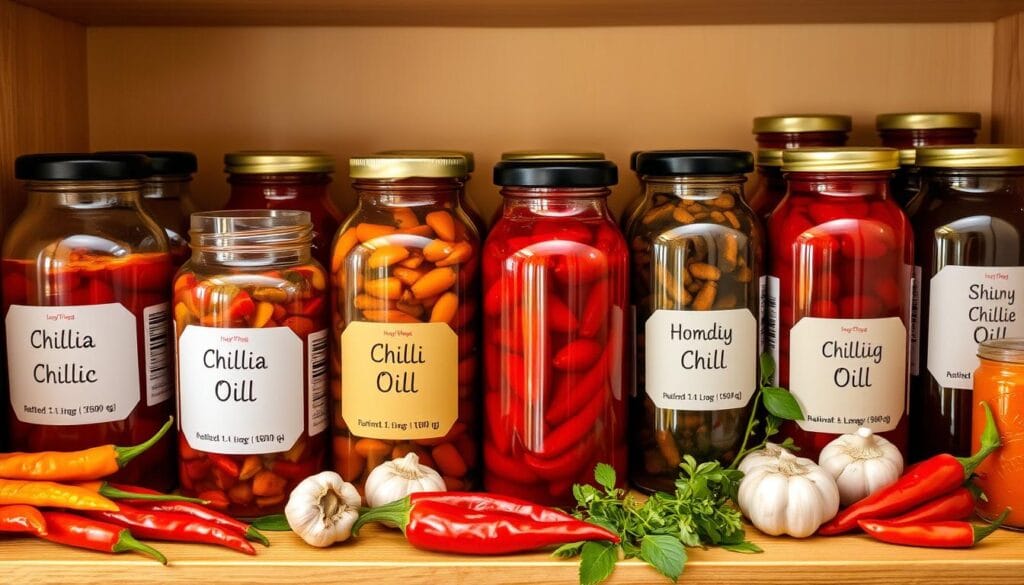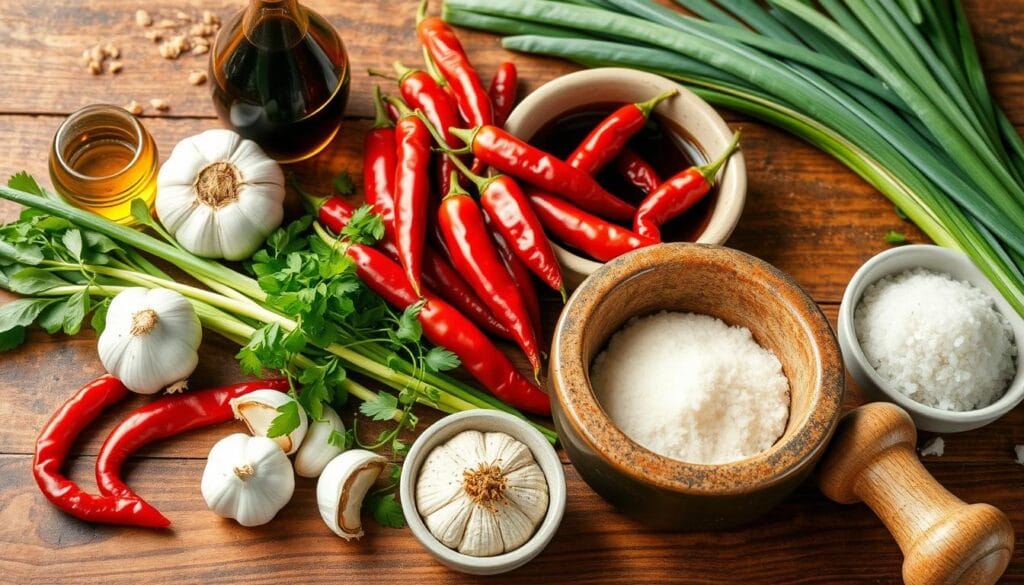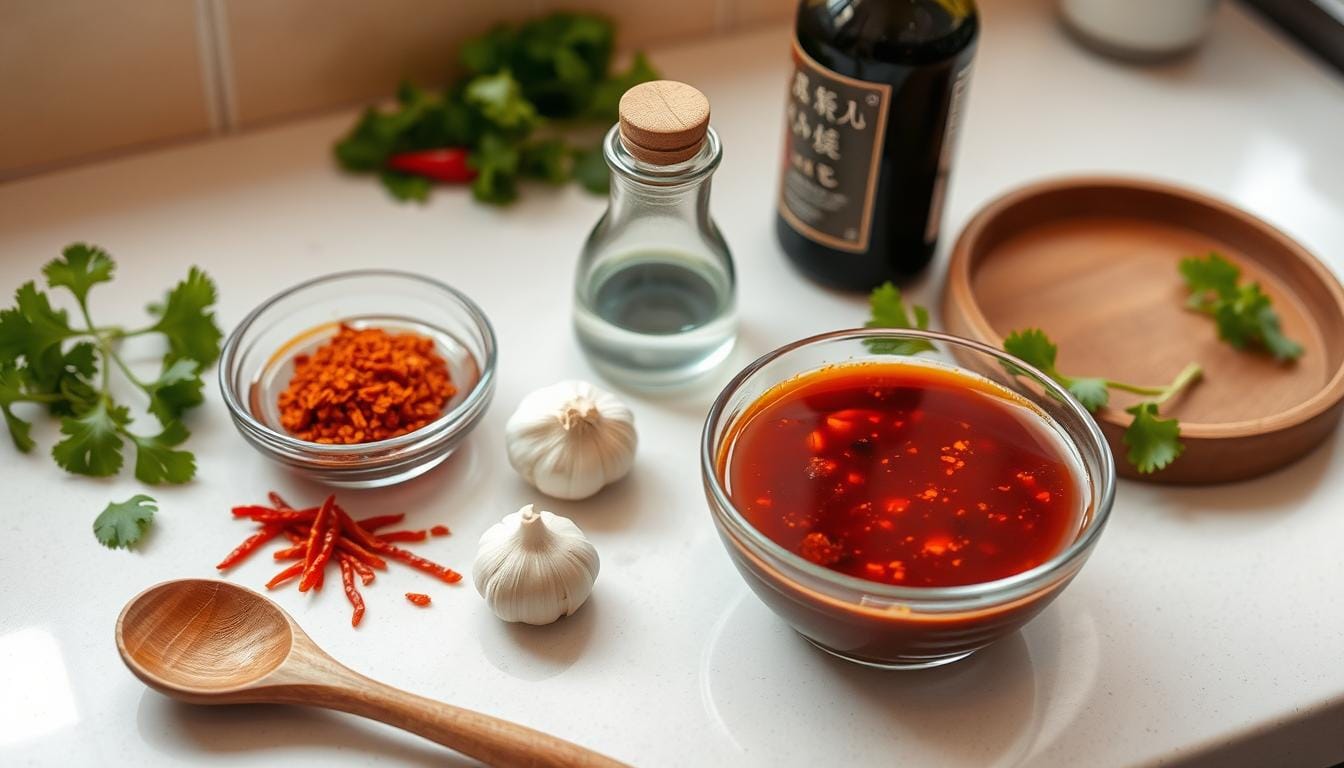Every food lover remembers that first amazing bite of Din Tai Fung’s authentic Chinese dishes, elevated by their signature homemade chili oil. It’s like a flavor explosion that turns simple recipes into works of art. This homemade chili oil recipe is more than just a condiment; it’s your chance to bring the rich flavors of authentic Chinese cuisine right to your kitchen. with for din tai fung spicy sauce recipe.
Imagine making Din Tai Fung’s famous spicy sauce with just a few ingredients. This recipe will show you how to make that perfect mix of spicy, tangy, and rich flavors at home. with for din tai fung spicy sauce recipe.
Table of contents
Introduction to Din Tai Fung’s Spicy Sauce
The din tai fung restaurant has become a global sensation. It started as a small oil shop in Taiwan and now is loved worldwide. Founded in 1958, it has amazed food lovers with its amazing dishes.
Today, Din Tai Fung has 181 locations around the globe. It has changed the way we see dumplings and created a famous spicy sauce. This sauce is loved by many.
The Legend of Din Tai Fung
Din Tai Fung’s story is truly inspiring. It began as a store selling cooking oil but soon became famous for its dumplings. Their dedication to quality is clear:
- Hand-making dumplings with 18 precise folds
- Using transparent kitchens to showcase culinary craftsmanship
- Maintaining consistently high-quality ingredients
Why You Should Try Making Your Own Sauce
Making your own taiwanese spicy sauce has many benefits:
- Customize heat and flavor to your preference
- Save money compared to restaurant pricing
- Experience authentic Din Tai Fung flavors at home
“Cooking is about passion, and our sauce captures the essence of Din Tai Fung’s culinary spirit.” – Anonymous Chef
By making their legendary sauce, you can bring a bit of Din Tai Fung into your kitchen.
Ingredients Needed for the Recipe
Making a true Sichuan spicy sauce needs the right ingredients. These ingredients bring out the traditional flavors. Knowing what to use will make your homemade sauce a hit.
Creating a homemade spicy sauce is all about precision and quality. The best sauce comes from choosing the right ingredients. These ingredients add depth and character to your dish.
Essential Ingredients You Must Have
Here’s what you need for your spicy sauce:
- Fresh garlic cloves (2-3 minced)
- High-quality canola oil
- Authentic chili oil
- Granulated sugar
- Red chili flakes
- Dark soy sauce
- Rice vinegar
- Ground white pepper
“The secret to an incredible spicy sauce is balancing heat and flavor.” – Sichuan Cooking Expert
Suggested Variations for Extra Flavor
Want to add more flavor to your Sichuan dish? Try these optional ingredients:
| Ingredient | Flavor Profile | Recommended Amount |
|---|---|---|
| Star Anise | Warming, licorice-like | 1-2 pieces |
| Chinese Five-Spice Powder | Complex, aromatic | 1/2 teaspoon |
| Sesame Oil | Nutty, rich | 1 tablespoon |
| Chinkiang Black Vinegar | Deep, slightly sweet | 2 teaspoons |
Pro tip: Adjust ingredient ratios to personalize your spicy sauce and match your preferred heat level.
Step-by-Step Instructions for Preparation
Making your own chili oil and spicy dipping sauce needs care and love. The right steps can turn simple ingredients into a top-notch condiment. This can make your favorite dishes even better.
First, get all your ingredients and tools ready. Being precise is key to making a tasty spicy dipping sauce.
Preparing Your Ingredients
To make real homemade chili oil, choose your ingredients wisely. Here’s what you need:
- Fresh garlic cloves, finely minced
- High-quality chili flakes
- Sesame oil
- Neutral cooking oil
- Salt and sugar
“The secret to a great spicy dipping sauce is in the details of preparation.” – Professional Chef
Mixing and Combining the Sauce
Here’s how to make your ideal spicy dipping sauce:
- Heat a small saucepan over medium-low heat
- Add minced garlic and chili flakes
- Pour in oils slowly, stirring constantly
- Whisk ingredients until fully combined
- Cook for 3-5 minutes, allowing flavors to meld
It’s important to keep an eye on the heat. You want to mix flavors well without burning anything. A slow, gentle method makes a rich, complex homemade chili oil that will wow your guests.
Pro tip: Let your spicy dipping sauce cool down completely before putting it in a container. This lets the flavors get better and makes the sauce smooth and even.
Tips for Achieving Authentic Flavors
To make authentic Sichuan cuisine, it’s not just about following a recipe. It’s about finding the right balance of flavors and picking the best ingredients for your spicy sauce.
Choosing the Right Peppers
Choosing the right peppers is key for authentic Chinese dishes. For a true Sichuan taste, try these peppers:
- Facing Heaven Peppers (Chao Tian Jiao): Classic Sichuan variety with moderate heat
- Dried Red Lantern Peppers: Provides deep color and intense flavor
- Sichuan Pepper (Hua Jiao): Offers a unique numbing sensation characteristic of Sichuan cuisine
Balancing Heat and Flavor
Creating the perfect spicy sauce is about more than just heat. It’s about finding a balance of flavors.
| Ingredient | Purpose | Recommended Amount |
|---|---|---|
| Chili Oil | Base Heat | 2-3 tablespoons |
| Rice Vinegar | Acidity Balance | 1 tablespoon |
| Sugar | Flavor Depth | 1 teaspoon |
| Sichuan Peppercorns | Numbing Sensation | 1/2 teaspoon |
“The secret to great Sichuan cuisine is not just heat, but the symphony of flavors dancing on your palate.”
Creating authentic spicy sauce is all about trying new things. Start with these tips, but feel free to change things up based on what you like. The fun is in the journey, not just the end result.
Serving Suggestions for Your Spicy Sauce
Making a tasty dim sum spicy sauce opens up many culinary doors. Your homemade sauce can turn simple meals into special dining moments.
This spicy sauce is very versatile. It lets you try many tasty ways to serve it, making your cooking even better.
Best Dishes to Pair with the Sauce
Your dim sum spicy sauce can make many dishes even better with its bold taste. Try these great pairings:
- Steamed dumplings
- Crispy wontons
- Fried rice
- Grilled meats
- Vegetable stir-fries
How to Use It in Your Cooking
Trying out this spicy sauce can really change your meals. Here are some fun ways to use it:
- Dipping Sauce: Serve with dumplings or spring rolls
- Marinade: Coat chicken or tofu before grilling
- Drizzle: Add a spicy touch to noodle dishes
- Stir-Fry Enhancer: Mix into wok-cooked meals
Pro tip: Start with a small amount of sauce and adjust to taste. The heat can be intense!
Remember, your homemade dim sum spicy sauce is a versatile condiment. It can bring restaurant-quality flavors right to your kitchen table.
Storing Your Spicy Sauce
Making your own chili oil is a fun cooking journey. But, knowing how to store it right is key to enjoying it for weeks. Keeping your spicy sauce fresh and flavorful is all about the right storage.

Optimal Storage Conditions
- Use a clean, airtight glass container
- Store in the refrigerator to preserve freshness
- Keep away from direct light and heat sources
- Ensure the container is completely sealed
Shelf Life and Freezing Tips
Your homemade chili oil stays fresh for about two weeks in the fridge. For longer storage, freezing is a great choice:
- Portion the sauce into small containers or ice cube trays
- Freeze individual servings for easy future use
- Transfer frozen portions to a freezer-safe bag
- Thaw gently in the refrigerator before use
“The secret to great asian condiment recipes is not just in the making, but in the careful storage.” – Culinary Experts
Pro tip: Always check for any signs of spoilage before using stored sauce. Look for unusual odors, color changes, or mold growth.
Quick Storage Checklist
- Refrigeration time: Up to 2 weeks
- Freezer storage: Up to 3 months
- Best container: Glass with tight-fitting lid
- Thawing method: Slow refrigerator thaw
Troubleshooting Common Issues
Making the perfect spicy sauce can be tricky. It’s especially hard when using homemade chili oil and delicate ingredients. Every home cook faces challenges that can make or break their dish.
Don’t worry if your homemade chili oil doesn’t turn out right. Here are some expert tips for common flavor and heat problems:
Taming an Overly Spicy Sauce
Got a sauce that’s too hot? Try these quick fixes:
- Add a teaspoon of sugar to balance the heat
- Mix in neutral oil to dilute spiciness
- Incorporate a bit of honey for sweetness
- Blend in yogurt or cream for a cooling effect
“The key to perfect spicy sauce is balance, not just heat.” – Culinary Expert
Adjusting Flavor Profiles
When your spicy sauce ingredients don’t taste right, try these adjustments:
- Increase garlic for deeper flavor
- Add more rice vinegar for tanginess
- Experiment with different chili types
- Adjust soy sauce for umami depth
Remember, spicy sauce flavors get better over time. Let your sauce rest for a few hours before making final tweaks. The flavors will often improve with patience.
Health Benefits of Spicy Ingredients
Exploring sichuan cuisine shows a link between flavor and health. Spicy sauce ingredients do more than excite your taste buds. They offer a nutritional boost that changes how we cook and eat.
- Capsaicin in chili peppers boosts metabolism
- Reduces inflammation in the body
- Supports cardiovascular health
- Enhances immune system function
Nutritional Powerhouses in Your Spicy Sauce
The main parts of sichuan cuisine add more than heat. Let’s look at their nutritional value:
| Ingredient | Health Benefits | Nutritional Impact |
|---|---|---|
| Chili Peppers | Metabolism Booster | Rich in Vitamin C |
| Garlic | Immune Support | Antioxidant Properties |
| Soy Sauce | Protein Source | Low in Calories |
| Vinegar | Digestive Aid | Supports Blood Sugar Control |
The Culinary Magic of Spices
Spices do more than add flavor. They tell a story of cultural heritage and open a window to global cuisines. In sichuan cuisine, spicy sauce ingredients are more than just condiments. They are an art form that connects nutrition, flavor, and culture.
“Food is our common ground, a universal experience.” – James Beard
Using these spicy sauce ingredients in your cooking is more than just making a meal. It’s a journey of flavor, health, and cultural discovery that goes beyond the plate.
Customizing the Recipe for Dietary Needs
Adapting the din tai fung spicy sauce recipe for different diets is easy. It keeps the flavor great. Asian condiment recipes are very flexible. This lets home cooks make their dishes just right.

Making It Gluten-Free
Making your spicy sauce gluten-free is easy. Just make a few changes:
- Use tamari instead of soy sauce
- Check that your chili oil is gluten-free
- Try gluten-free vinegar instead
Vegan Adaptations
Vegans can enjoy this sauce by making a few changes:
- Choose plant-based chili oils
- Leave out animal products
- Try mushroom-based umami enhancers
Low-Sodium Adjustments
Lowering sodium doesn’t mean losing flavor. Try these smart swaps:
| Original Ingredient | Low-Sodium Alternative |
|---|---|
| Regular Soy Sauce | Low-Sodium Tamari |
| Salt | Herbs and Spices |
| Standard Chili Oil | Homemade Chili Infusion |
“Dietary restrictions are opportunities for culinary creativity” – Chef Anonymous
Your din tai fung spicy sauce recipe is a great base for your dietary needs. Try new things, taste, and have fun!
Feedback from Din Tai Fung Enthusiasts
Exploring authentic Chinese dishes often leads to finding passionate food communities. Din Tai Fung fans are especially eager to share their homemade spicy sauce stories.
What Home Cooks Are Saying
Food bloggers and home cooks have shared their amazing experiences making Din Tai Fung’s spicy sauce. They’ve found ways to make the sauce their own, adding exciting twists.
- Many praise the sauce’s ability to capture authentic Chinese dishes flavors
- Experienced cooks recommend specific chili oil brands
- Personalization is key to making the sauce unique
Community Recommendations
“The secret is in balancing heat and depth of flavor!” – Emily Chen, Home Cook
Culinary enthusiasts offer creative tips to improve the spicy sauce recipe:
- Add a splash of sesame oil for depth
- Experiment with different pepper varieties
- Adjust spice levels to personal preference
Sharing Your Culinary Journey
Your unique twist could inspire others. Share your sauce-making journey and results. This can build a community of home chefs passionate about authentic Chinese dishes.
Frequently Asked Questions
Creating the perfect din tai fung spicy sauce recipe can raise several questions for home cooks. Knowing how to store, prepare, and customize your spicy sauce ingredients is key. This will help you get delicious results every time.
How to Store Your Homemade Spicy Sauce
Proper storage is crucial for maintaining the quality of your din tai fung spicy sauce recipe. Follow these guidelines to keep your sauce fresh and flavorful:
- Use an airtight glass container for storage
- Refrigerate immediately after preparation
- Consume within two weeks for optimal taste
- Consider freezing in small portions for extended preservation
Ingredient Substitution Tips
Flexibility is key when working with spicy sauce ingredients. You can adapt the recipe based on availability and personal preference:
- Replace Chinese black vinegar with white vinegar
- Experiment with different types of chili oil
- Adjust heat levels by changing pepper varieties
- Use alternative oils if needed
“The beauty of a homemade sauce is its ability to be personalized to your taste.” – Culinary Expert
Always taste and adjust seasonings when making substitutions. This ensures the best flavor profile for your din tai fung spicy sauce recipe.
Conclusion and Final Thoughts
Learning to make Din Tai Fung spicy sauce is more than just a recipe. It’s about exploring your creativity in the kitchen. Every time you make homemade chili oil, you learn more about flavors and what you like.
The secret to perfecting Din Tai Fung spicy sauce is to experiment. Begin with the basic recipe, but feel free to tweak it to your taste. You can adjust the chili peppers, oil temperature, and spice levels to make it your own. For more great recipes please click here.
Encouraging Experimentation with Flavors
Asian cooking is all about personal touch. Your homemade chili oil can make any dish special. Remember, getting better takes time and practice. Each batch of Din Tai Fung spicy sauce brings you closer to being a pro.
Your Journey to Spicy Sauce Perfection
Enjoy the journey of learning and improving. Your spicy sauce will change with each try, showing your growing skills. Keep tasting, adjusting, and enjoying the delicious outcome of your cooking adventures.

